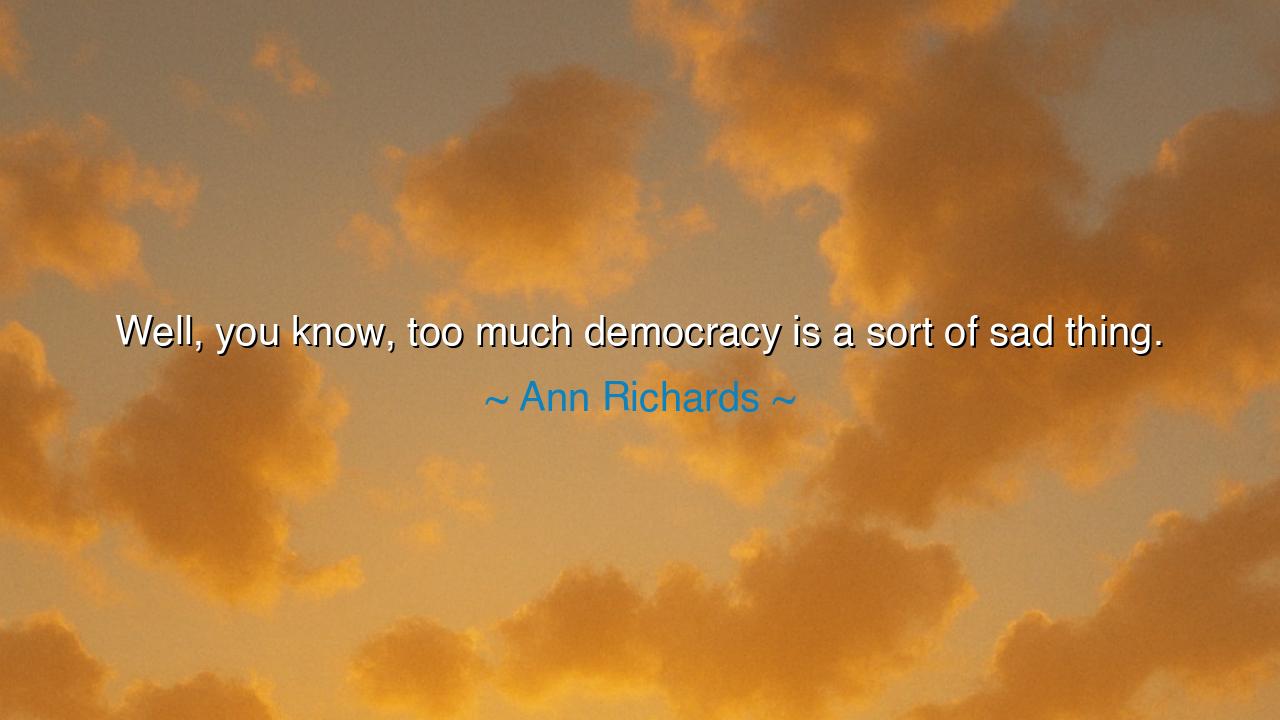
Well, you know, too much democracy is a sort of sad thing.






Ann Richards, a woman of wit and steel, once remarked: “Well, you know, too much democracy is a sort of sad thing.” To the untrained ear, her words may sound paradoxical, even mocking of the very principle she often championed. But in truth, her saying reveals the ancient tension between liberty and order, between the chorus of many voices and the harmony required for progress. She speaks not against democracy, but against its excesses, reminding us that even virtues, untempered, can become vices.
The heart of her words lies in the recognition that democracy, when stretched beyond balance, may collapse into noise. If every decision is endlessly debated, if every voice demands absolute equality in every matter, governance falters. What should be the strength of a people—their diversity of thought and shared power—can become a weakness when it dissolves into endless argument or indecision. Thus, Ann Richards calls it sad, for it betrays the promise of democracy by drowning clarity in cacophony.
History gives us many examples of this truth. The ancient Athenians, proud inventors of democracy, sometimes fell into the trap of too much freedom without restraint. In their assemblies, impassioned orators swayed the people from one decision to its opposite, often within days. This instability weakened Athens, leading at times to disastrous wars and the eventual decay of its political strength. Even Aristotle warned of this danger, naming it “ochlocracy”—the rule of the mob—where democracy unbounded by wisdom collapses into chaos.
And yet, Richards’s remark does not call us to abandon democracy. Rather, it calls us to refine it. Democracy must be guided by discipline, by the recognition that not every issue can be decided by whim, and not every voice can carry equal weight in every matter. Leadership, law, and vision are required to harness the energy of the people without being consumed by it. It is the balance between participation and guidance, between freedom and responsibility, that sustains a just society.
Her words also carry a warning for the modern world. In an age of constant communication, where every opinion is broadcast in an instant, the temptation of “too much democracy” looms larger than ever. Endless referendums, polls, and populist pressures can paralyze leaders and erode institutions. The sadness Richards names is that when democracy becomes mere performance, it ceases to serve its true purpose: the pursuit of the common good.
The lesson is this: honor democracy, but guard against its excess. Cherish the voices of the people, but ensure that they are channeled toward wisdom and justice, not endless division. Recognize that democracy is not only a right but also a responsibility—to listen with humility, to compromise, to entrust leadership when needed, and to protect the system from being consumed by its own abundance.
Practically, this means cultivating respect for institutions, for leaders of integrity, and for the process of deliberation itself. It means resisting the temptation of constant upheaval and instead working steadily toward the common good. It calls us to be participants in democracy who contribute not only our voices but also our patience, our reason, and our discipline.
Thus, Ann Richards’s words, half jest and half wisdom, endure as a reminder: too much democracy without balance is indeed sad, for it turns strength into weakness. But democracy tempered by wisdom, guided by justice, and sustained by responsibility—this is no sad thing, but the noblest inheritance of free peoples.






AAdministratorAdministrator
Welcome, honored guests. Please leave a comment, we will respond soon